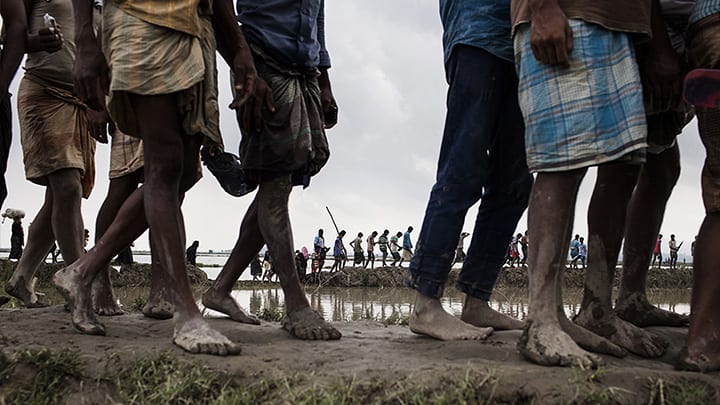
2019 FotoEvidence Book Award + World Press Photo
Thursday
May 30, 2019 | 6pm
FEATURING
Patrick Brown | Mikael Owunna | Fausto Podavini
Winner of the 2019 FotoEvidence Book Award with World Press Photo
Patrick Brown | "No Place on Earth"
No Place on Earth by Patrick Brown is the recipient of the 2019 FotoEvidence Book Award with World Press Photo. The Book Award is given each year to a photographer whose work demonstrates courage and commitment in documenting social injustice.
Since 2017, photographer Patrick Brown has documented the world's fastest-growing refugee crisis and one of the most rapid human outflows in recent history. Risking death at sea or on foot, more than 700,000 Rohingya fled the destruction of their homes and persecution in the northern Rakhine State of Myanmar for neighboring Bangladesh. Arriving at the makeshift camps, most refugees reported harrowingly consistent stories of murder and rape, all of which testify to a deliberate campaign of eradication. 
No Place On Earth provides an intimate portrait of the survivors of the recent persecution and their bleak conditions in overcrowded refugee camps.
The publication of the book No Place on Earth was made possible with the support of: Pulitzer Center, Grodzins Fund, Fujifilm, World Press Photo, Fortify Rights.
The hardcover book No Place On Earth contains 98 colour photographs with associated texts by Jason Motlagh an introduction by Matthew Smith director of Fortify Rights and the design by the renowned book designer Stuart Smith. Learn more about the book here.
FINALISTS

Finalist of the 2019 FotoEvidence Book Award with World Press Photo
Mikael Owunna | "Limitless Africans"
The work is a collaborative response between the photographer and his community, to re-define what it means to be an immigrant, African and queer in North America and Europe at this time. Learn more about the work here.

Finalist of the 2019 FotoEvidence Book Award with World Press Photo
Fausto Podavini | "OMO Change"
Omo Change documents the story of big investments from European and Chinese countries in the Omo Valley, in Ethiopia. The Omo Valley is internationally recognized as a rare dry and semi-dry region with extraordinary biodiversity. It has been included in the list of UNESCO heritage sites. The work aims to be a meditation on how large-scale investments can put at risk a delicate balance between humans and their environment that has persisted for hundreds of years. Learn more about the project here.
Free and open to the public.
ON VIEW
May 30- June 9, 2019
BDC Annex, 364 E. 151st St, Bronx, NY 10455
ARTIST TALK + BOOK PRESENTATION
No Place on Earth by Patrick Brown
June 8th, 7PM
About FotoEvidence
FotoEvidence Press was founded in 2010 to continue the tradition of using photography to draw attention to human rights violations, injustice, oppression and assaults on human dignity wherever they may occur. Photographs have not only changed people’s perception but, in some cases, altered the course of history.
For eight years, the FotoEvidence Book Award recognized one photographer whose work demonstrates courage and commitment in the pursuit of social justice and, in 2017, FotoEvidence partnered with World Press Photo. The book award was renamed the FotoEvidence Book Award with World Press Photo. The selected project is published by FotoEvidence as part of a series of photo books dedicated to the work of photographers, whose commitment and courage deliver painful truths, creating awareness and intolerance towards violations of human dignity.
MAIN PHOTO: Rohingya refugees from Myanmar walking through paddy fields and flooded land after they crossing over the border into Bangladesh. An unprecedented 430,000 Rohingya refugees, over 240,000 of them children, have fled Rakhine State in Myanmar into Cox's Bazar district of Bangladesh. Minors make up at least 60 percent of the 430,000 Rohingya who have crossed the border to Bangladesh over the past few weeks. Highly traumatized, they are arriving malnourished and injured after walking for days to the safety of Bangladesh. Patrick Brown © 2019 Panos/UNICEF
INTERIOR PHOTOS:
Noor Haba, 11, carries her family’s belongings to shore after they had sailed for five hours in the fishing boat to arrive early morning on Shamlapur Beach near Cox’s Bazar. Noor and her family had escaped the violence in Rakhine State with a group of 25 other Rohingya refugees.
7 September 2017. Patrick Brown © 2019 Panos/UNICEF
Jihan – Trans Algerian Man (Pronouns : he) Shot in Brussels, Belgium 2017 “For me Limitless in an important project for the next generations. That they can have some faces, some references and not waste time as we did because we were scared or we felt alone and/or ashamed. We grew up with only caucasian and heteronormative representations, so that is hard sometimes to realize that we will never match this limited model. For the people who are isolated, it can be very difficult. However when we have access to very positive, strong images, that resemble us or to which we can identify, it really gives hope and momentum.” © Mikael Owunna
A Borana woman inside a well is getting water for her animals. In this extremely dry area, in the dry season, water is taken from 20 meter deep wells, where the aquifer is located. The appropriation of land by the Government for the construction of sugar cane plantations, is resizing the geographical borders of the tribes of the Omo Valley. The tribes are forced to migrate to other areas, and to change their customs and lifestyles. South Ethiopia, 2013 © Fausto Podavini
